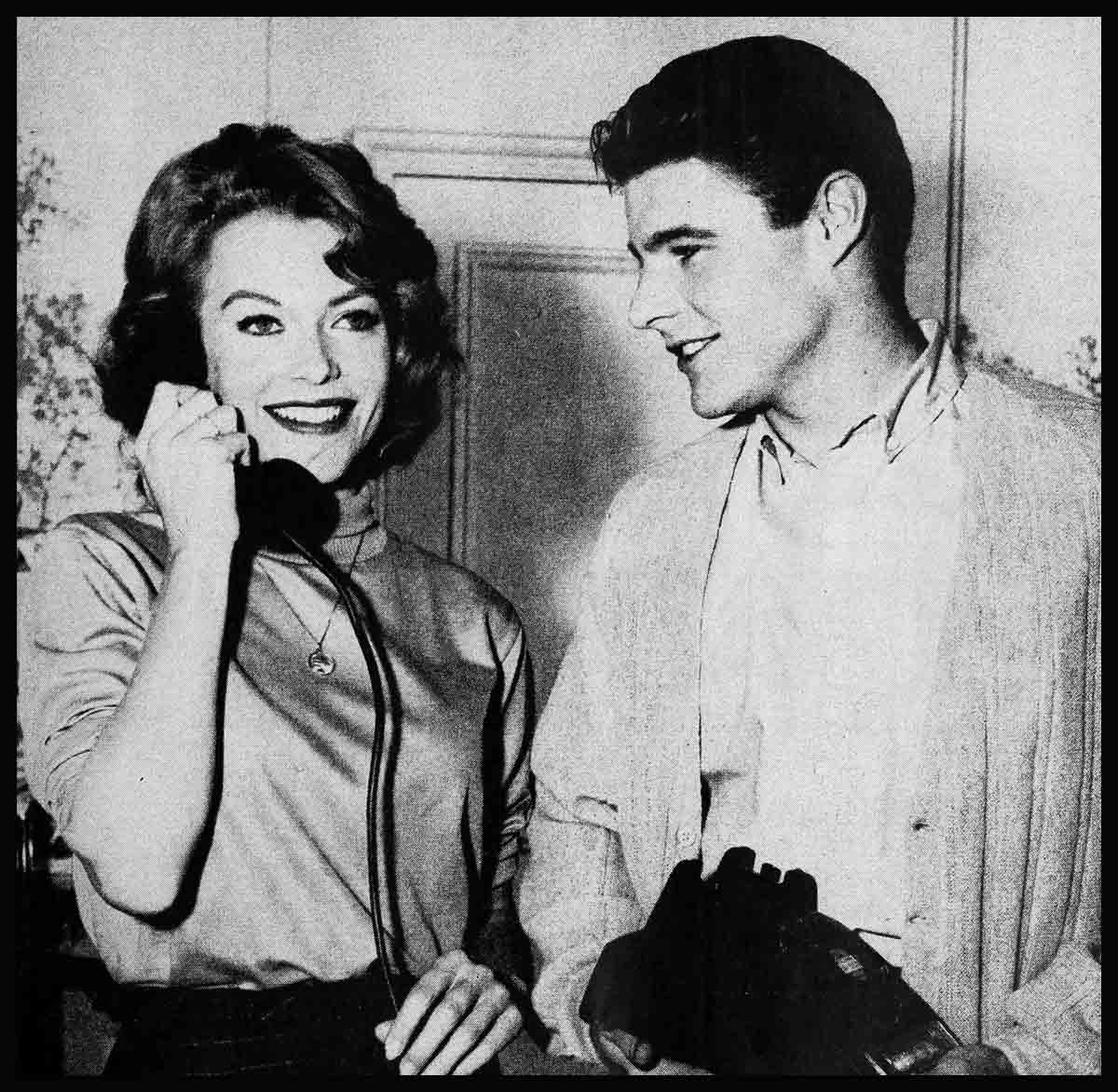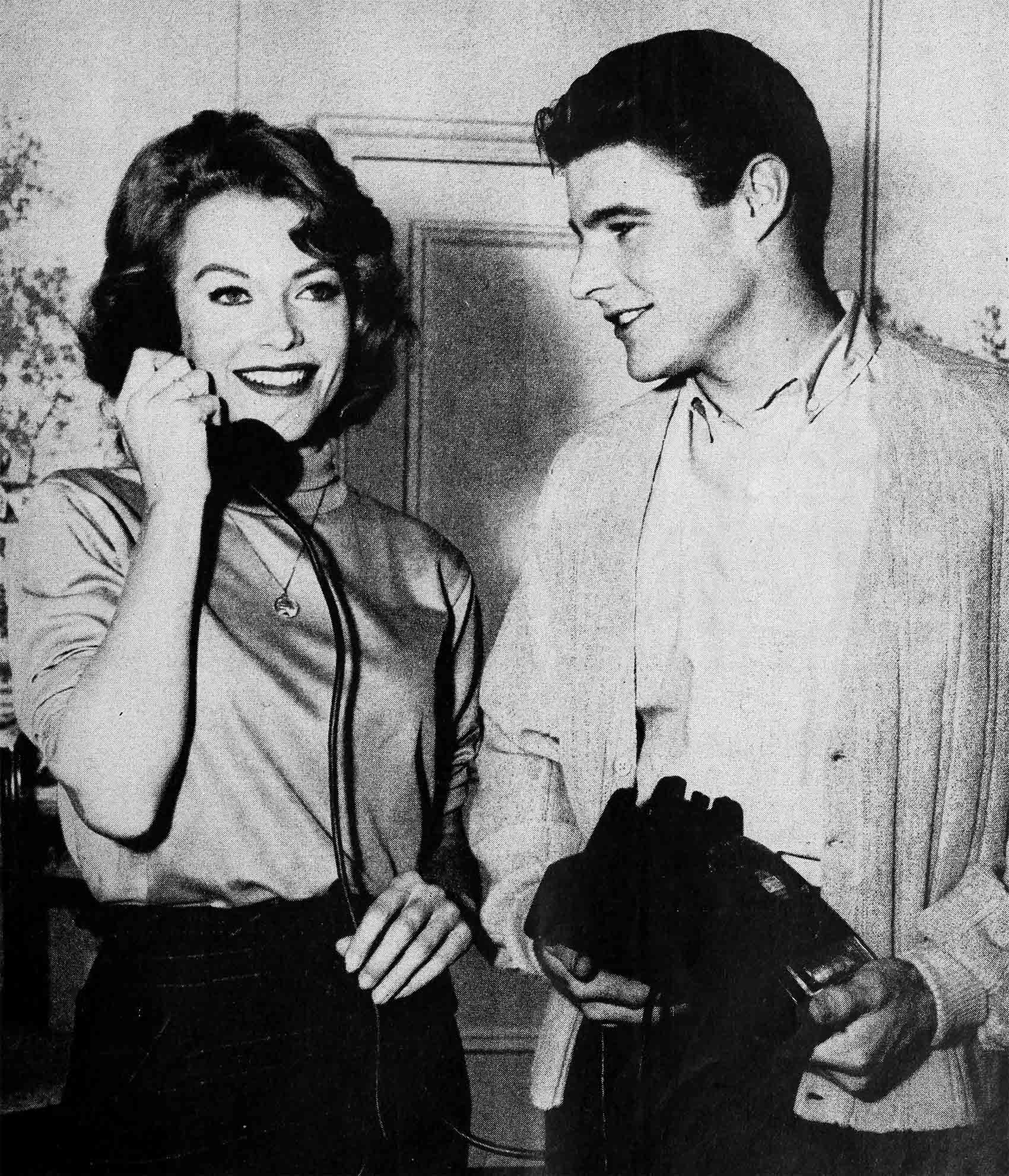
David Nelson & June Blair
The first notes of “Here Comes the Bride” breathe through the Church of the Hills at Forest Lawn. At the rear, a tiny plumed bird in a gilded cage chirps happily, competing against the grander music. At the far end of the aisle, David Nelson waits for his bride. Rick, his brother and best man, waits with him. And she appears—a vision walking. On both sides of the center aisle, traditionally the bride’s side and the groom’s side, heads turn and there is a soft gasp. “She’s beautiful!” they whisper, and she is—this June Blair, with skin as porcelain-toned as her bridal gown, and blue-gray eyes radiant with unshed tears of joy. For this is her wedding day. And nobody in the church knows it, but today—May 20th—she is really Cinderella, but truly! All her lonely years were lived for this day . . . when she will marry the prince of her dreams. On the arm of her dear friend and drama coach, Blair Cutting, she comes slowly down the aisle to David’s side, and for one long moment their eyes meet. Then arm in arm they walk up three steps to the altar, where seven tapers flicker on either side. Behind the pastor the day’s last sunrays glow through the holy cross in the stained glass windows. In so much beauty they bow their heads and hear the pastor recite the lovely ritual that will make them one in the eyes of God. . . . And the bride thinks, with a catch at her heart, “If my mother were alive she’d have seen in the papers that this is my wedding day—and she would be here. I know she would come.” . . . Just behind her, in the front row, sit David’s parents, Harriet and Ozzie Nelson—loving and happy and proud. And up here at the altar, Rick is beside him. His family, close and warm. But it’s all right—it’s wonderful—it’s perfect—because Cinderella’s story has a happy ending, always . . . but never a happy beginning. And for June it was no different than for any Cinderella. The beginning was rough.
Her father was someone she didn’t remember at all. Her mother she remembered as crying bitterly the few times she saw her. At age four she was put in an orphanage. From then on her life was a jumble—in and out of orphanages and foster homes—of running away and being brought back—and then into court because she was miserable with the woman who had become her legal guardian in this grab-bag of an existence.
When there was a court fight—her real mother would reappear, weeping helplessly. Until, one sensitive woman judge, seeing before her a tormented youngster, angrily threatened to settle the whole argument of custody by putting June in El Retiro House for Girls. She didn’t belong in a place like El Retiro, she’d done no wrong, but if there were no other way. . . . That ended the legal disputes. She was left a ward of the court, in peace—and loneliness.
At fourteen a kinder influence came into June’s life. She met a Lutheran minister. Pastor Candow. He guided and encouraged her, found her a foster home where there was love and understanding. Later she moved in with another Los Angeles family, the Belknaps, who also befriended her.
At sixteen and a beauty, June went out on her own into the competitive scramble of movie extra bits, modeling and magazine covers, where Warner Brothers discovered her. They sent her to a drama school run by Blair Cutting, and he set her on the path to movie contracts and TV.

They met by chance
At eighteen she met David Nelson. By sheer chance. For never were there two people from worlds further apart. One thing, though, they had in common: Fame and fortune hadn’t spoiled David any more than hard knocks had spoiled June.
The chance by which they met was a party at David Hedison’s house one spring night in 1959. It was chancy because David Nelson wasn’t much for parties. But this night he and his date, Venetia Stevenson, decided to go for a little while.
All of Hollywood’s younger set was in the jam-packed crowd. Venetia literally bumped into a young actress with whom she had just worked. The girls greeted each other. Venetia said. “Dave, I’d like you to meet June Blair.” David smiled, said “Hi” to June and shook hands with her date, Lindsay Crosby.
That was all. But when the party was over, Lindsay invited some people, including David and Venetia. to come on to his house for more food and talk.
Lindsay’s car led the way—through Beverly Hills, down the Sunset Strip, and on to a dimly lit, winding road. Somewhere David took a wrong turn. He never did get to Lindsay’s, and never saw June again—not for the next year.
But he thought of her often. He’d pick up the paper and there she was, at a splashy premiere or a glittering party. He’d sure like to see her—but her kind of socializing wasn’t his. “And that pretty girl.” he told himself, “isn’t likely to dig a Saturday night at the neighborhood movie. Better if you don’t run into her, my boy, you’re not the type.” But he still didn’t forget her.
A whole spring later, Dave and Rick were at the studio taping an “Ozzie and Harriet” adventure called, “His Brother’s Girl.” The script said Rick got the girl in Act One, but by the end of Act Two she’d end up in David’s arms, where she wanted to be all along.
The girl walked on the set—a coppery-haired beauty. She was June Blair!
His golden opportunity
Now Dave had the golden opportunity he’d dreamed of all year. And what did he do with it? He and June said “Hello” and then talked from the script only. There was so much he wanted to tell her, but he was too shy. He needed time to speak his piece—and he had to leave for Hawaii with the Flying Viennas and their trapeze act . . . then a stint with the Air Force . . . then to Texas for more trapeze shows . . . and by October, back for another Nelson adventure, “David Hires a Secretary.” The secretary was June.
David watched her walk into his life again. He promised himself: This time I won’t waste my chances. He found a moment alone with her, somewhere behind the big cameras. He asked for a date. She said sorry, she was busy. He asked another time, and she said no. Again, and she said never on work nights.
Then he, Ricky, June and another girl flew on location to film TV commercials. High in the sky, away from the lights and cameras, David and June really talked for the first time. They’ve been at it ever since. They’d plan dinner and a show and end up seeing no show, only talking, till near dawn. He discovered that the “glamour” dating which so awed him was all duty stuff and terrified her. All she’d ever wanted was simple fun. Like this.
He found her more than beautiful, she was the three W’s—warm, witty, wonderful. She was everything he wanted in a girl—in a wife. And soon as he knew this, he had to go to Germany to do a movie, “The Big Show.” He was torn, he didn’t want to go now, but he had signed the contract.
He promised to write
He left early in November, saying only that he’d write. But he wasn’t good at putting his feelings on paper, he was more of a postcard correspondent. . . . He returned at Christmas, bringing June a beautiful coat from Germany. . . . They saw the New Year in together, and at the sun’s first rays he told her, “I think I’m in love with you.” He said “think ’ not to frighten her—a girl who was already in love with him.
One night in March they sat close on a sofa in a friend’s home, lost to anyone around. Suddenly, like a hurricane, his words whirled around her. “June, I’m so impatient. . . . I want everything to happen right now . . . I want things to go well with my career . . . with the show. I need a new truck for the trapeze gear . . . I love you . . . I want to be a success . . . I want a home and children . . . I need a new truck . . .” She was confused. She wasn’t sure if he wanted her to marry him or buy him a new truck.
Next day. he told her they’d have to move fast if they were to he together when he left for Alaska with his circus show. But he didn’t propose! And he still hadn’t, next evening as they sat in her apartment. Dave was talking on and on , about their plans, and she listened—until she could take no more!
“Why,”’ she implored, “are you discussing our future when you haven’t even asked me yet?”
“Well, what do you think I was doing yesterday at lunch?”
“You were telling me,” she said, almost shyly. “But you didn’t ask me.”
He stared at her. Then he got it.
“Okay,” he said. “I’m asking you now. June, will you marry me?”
With a glad little cry, she flew into his arms. He had proposed!
They waited four days for the right moment to tell the Nelsons—who promptly lent their Laguna beach home for a week’s honeymoon before leaving for Alaska, They set the date. May 20th. Dave gave June a round diamond in an old-fashioned gold setting, ft was a replica of the one Ozzie had given Harriet in their day, and June loved it.
Gift from the Nelsons
The Nelsons’ gift was a building plot in Hollywood Hills. June and David will put a ranch house on it, and until then rent a home for a year. But first they’ll honeymoon—from Alaska to Dave’s two-week stint in the Air Force Reserve, to the east for more circus shows. They’re traveling in a three-ton truck that hauls the trapeze gear. Dave had an addition built on to it for sleeping quarters and a kitchen. Goodbye to June’s “glamour” dates.
And goodbye to aloneness—forever. She had love now. and her prince, and his family to be her family. And friends she’d had all along, this she knows, today of all days. The minister who makes them man and wife—he is her old Pastor Candow. . . . The matron of honor is Penny Belknap Cooley, who’d been like a sister since the days June lived in their home. . . . And on the “bride’s side” sits another sister, Joyce Belknap. . . . And here is her maid of honor, Doris Crewz, who’d been her best pal since second grade. . . . And Blair Cutting, her old teacher, has given her in marriage like a father.
The music swells into the recessional and the young couple walk out smiling, past the rows of beaming faces. And as they go you can almost hear a fairy godmother’s voice above the soaring notes.
“Cinderella—goodbye!”
THE END
—BY MARCIA BORIE
Dave’s in “The Adventures of Ozzie and Harriet.” ABC-TV Wednesdays at 8:30 P.M. EDT and 20th’s “The Big Show.”
It is a quote. PHOTOPLAY MAGAZINE JULY 1961




